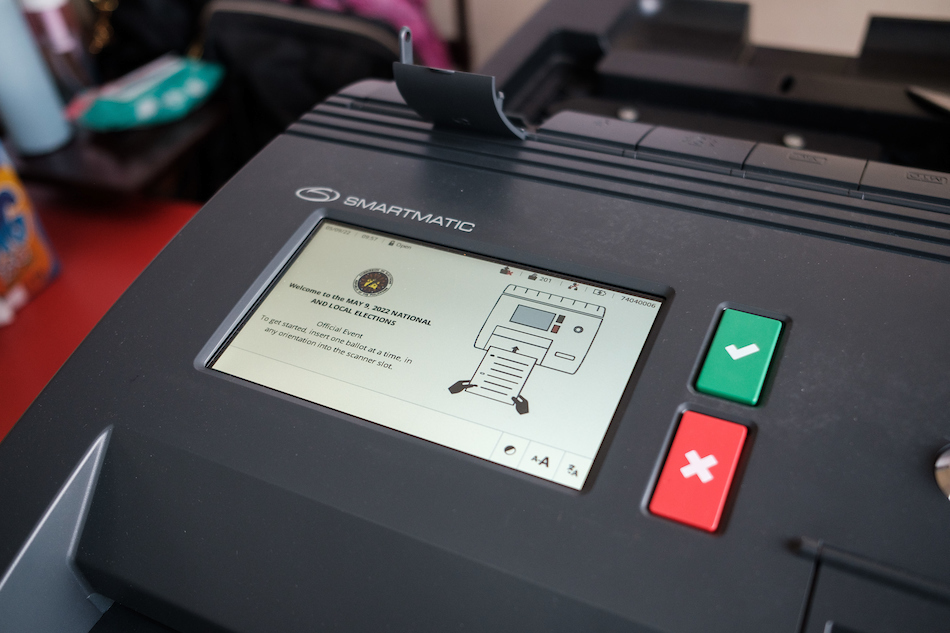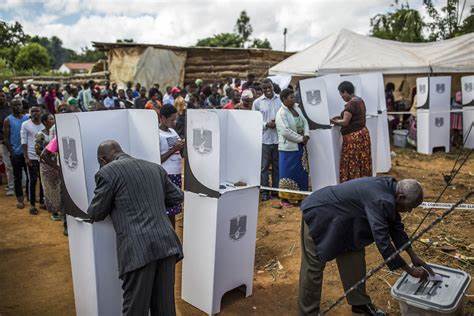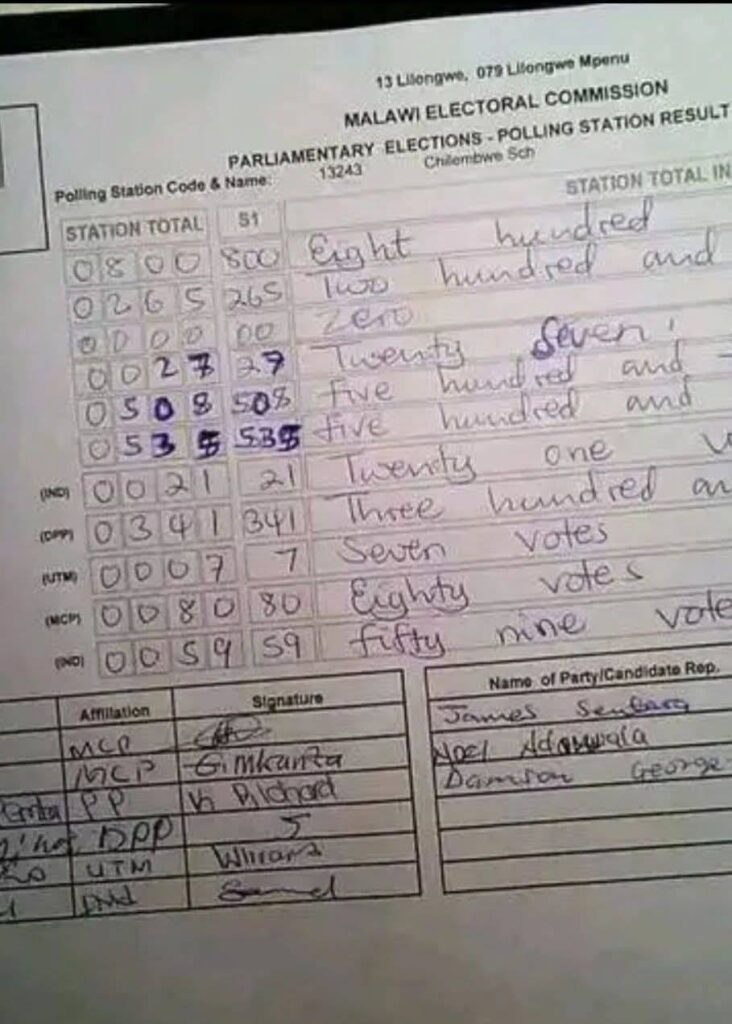Exposed! Emerging evidence suggests a deeper motive behind Democratic Progressive Party (DPP) President Arthur Peter Mutharika’s opposition to the use of the Smartmatic biometric system during the September elections. APM’s apprehension is based on robust verification capabilities of the system that could expose and invalidate a clandestine voter registration scheme done by the DPP to facilitate a systematic rigging of the votes.
As Malawi approaches the pivotal elections, Mutharika and the DPP have intensified campaign against the Malawi Electoral Commission (MEC) adopting Smartmatic system citing concerns over its integrity.

However, incriminating evidence has surfaced that the DPP conducted an unauthorized voter registration exercise using equipment they dubiously acquired through the National Registration Bureau (NRB).
A source within the DPP revealed that the NRB machine was in fact stolen from the Bureau before the DPP went out of government in 2020.
“This was intended to be used during the 2020 re-run but they failed to implement it because of the pressure they faced then. This time around they believe it is easier because to them they feel they have the support from Malawians and that will take out all the suspicions,” he said.
He said this covert operation registered more than a million individuals intended to bolster the DPP’s voter base and to at least close the gap with the guaranteed MCP votes from the central region.
However, this parallel registration did not utilize Smartmatic’s biometric systems, raising concerns within the DPP ranks about how they will penetrate the new system to authenticate and verify their entries.

The source disclosed that within the DPP circles, everyone knows that without rigging the votes, the party has no chance of coming back into government.
“They also know that this is their only chance to ensure a win, if they fail to force MEC to submit to their demands then they know the elections are lost even before voting. Peter Mutharika also knows that fact,” he added.
A former MEC Commissioner Dr Anthony Mukumbwa recently noted that the Smartmatic system, known for its stringent biometric verification processes, poses a significant hurdle for any unverified or fraudulent entries. This means that its implementation threatens to expose and nullify DPP’s illegitimate registrations, thereby undermining the DPP’s purported strategy to manipulate the electoral outcome.
In response to this looming threat posed by Smartmatic’s verification capabilities, the DPP has recently launched a concerted and deliberate campaign to discredit the system and force MEC to abandon it.
Notable individuals such as Dr. Mukumbwa and another former MEC Commissioner have publicly defended the procurement and implementation of the Smartmatic system, emphasizing its transparency and the extensive consultations involved.
Mukumbwa warns against politicizing the electoral process, stating, “Electoral matters are not for drama. If mishandled, they can cause civil war.”
The Anatomy of a Smear Campaign Against the Smartmatic
Over the past several weeks, the DPP and its proxies have staged press briefings, media appearances, and social media offensives, painting Smartmatic as a threat to democracy. They claim the system is unreliable, non-transparent, and vulnerable to manipulation.
Calls for reverting to a manual system have grown louder, with threats of mass protests and civil disobedience should MEC proceed with Smartmatic.
Yet, the timing and intensity of these protests raise red flags. Smartmatic was not a surprise decision by MEC. In fact, it was adopted through a transparent, consultative process that included political parties, civil society organizations, and international observers.
Dr. Mukumbwa, in a strongly worded statement, reminded the public that no objections were raised during Smartmatic’s procurement and pilot phases.
Mukumbwa’s words are not merely dramatic flair. Malawi has seen the consequences of contested elections, with the 2019 nullification and rerun still fresh in national memory. The attempt to now discredit a system that was once accepted by all stakeholders suggests a deep political strategy, not a technical concern.
Now, a more troubling explanation has surfaced—one that strikes at the core of DPP’s motivations. This revelation of a parallel registration platform, shifts the narrative significantly. If the DPP did indeed run a separate registration scheme, their campaign against Smartmatic is no longer about technology. It becomes a desperate attempt to suppress a system that could expose and invalidate their fake voter base.
Smartmatic’s strength lies in its biometric voter verification. Fake registrations that lack proper biometric data would be easily flagged during voter verification, rendering them useless on polling day. Thus, Smartmatic doesn’t just threaten the DPP’s electoral chances; it threatens to reveal a calculated, premeditated attempt to defraud Malawi’s democracy.

With Smartmatic, it is not possible to manipulate the votes
The DPP’s opposition to Smartmatic must also be seen in the broader context of its recent behavior. The party has shown a consistent pattern of undermining democratic institutions when it suits its agenda. Its silence during Smartmatic’s adoption has turned into fury only when it became clear that the system might prevent voter fraud.
Press briefings by so-called “Concerned Registered Voters” are suspiciously well-funded, frequent, and oddly synchronized with the DPP’s talking points.
Even more telling is the presence of DPP-linked figures such as Steve Chimwaza and Billy Banda at the forefront of these briefings. Their sudden emergence as champions of electoral integrity is incongruent with their previous lack of involvement in such issues. If this is a grassroots uprising, it is one with a very familiar script and bankroll.
Smartmatic is more than just a technological upgrade; it symbolizes a nation’s attempt to insulate its democracy from manipulation and fraud.
To surrender to pressure and abandon Smartmatic now would be to reward sabotage with appeasement. It would send a dangerous message that electoral systems can be weaponized by those who fear accountability. Worse, it would betray the trust of millions of Malawians who registered, often at great personal cost, in the belief that their votes would count.
First, MEC must stand its ground. The Commission, already under intense scrutiny, must not bend to political pressure. It must also proactively educate the public on how Smartmatic works and why it enhances rather than undermines transparency.
Second, the law enforcement agencies must investigate the alleged NRB equipment theft and parallel registration scheme. If substantiated, these actions constitute electoral crimes of the highest order and must be prosecuted as such.
Third, civil society, religious leaders, and the international community must rally in defense of electoral integrity. This is not just MEC’s battle; it is Malawi’s battle for democracy.
It is now clear. The DPP’s war on Smartmatic is not about software bugs or audit trails. It is about survival—the political survival of a party that fears free and fair elections. The only bugs they fear are the ones that will expose them.
Malawians must ask themselves: Why would any political party fear a system designed to verify the legitimacy of every vote?








